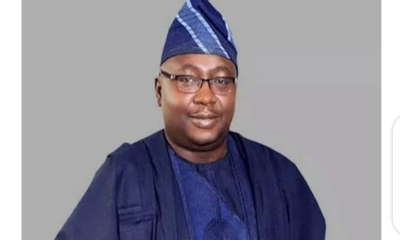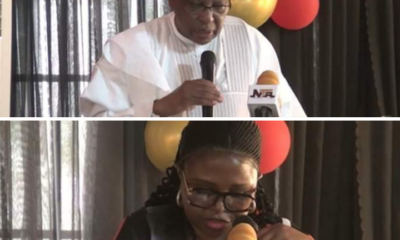Education
Conditions for Appointment of Professors MUST Change – FUTO’s Prof. Pantami Saga Explained Differently


Obviously, the Triple Helix model of Innovation that the National Universities commission (NUC) is advocating and promoting, and which is the current global best practice, is strange to a lot of people.
The courage of FUTO and Pantami to practically actualize this in our University system needs to be encouraged and applauded, NOT criticized ignorantly by even the so-called experts in academia.
In concepts such as the Knowledge Economy, the Triple Helix model of innovation seeks to promote interactions between the Academia, industry and Government in order to Foster Economic and Social development. Therefore, the model is conceived such that the 3 different bodies collaboratively play their roles to ensure that innovation is fostered and development eventually occurs.
Those following this development therefore, would not be surprised when recently, NUC is promoting that Professors in the Academia should go on their Sabbaticals to Industries or Government Regulatory agencies like NUC, Tetfund, NNPC, RMRDC etc., instead of the old practice of going to other universities. Similarly, University Councils and Senates are being encouraged to appoint as Tenure, Visiting or Adjunct Professors from highly experienced professionals in the Industry or Government, to come into the university from time to time, to share industry or policy experiences with the students. This, it is envisaged, would go a long way to promote innovation by giving students additional perspectives. Time it was when Professors of building Engineering, Robotics, Computer science, Business Administration, History, or any discipline for that matter were mere theorists with practical expertise. Working collaboratively with experienced industrial or Government policy practitioners is thus envisaged to change all that and if students are added to the equation, they would be better for it.
I am therefore not surprised that Pantami, as the minister of the Digital Economy and one of the Champions of the Knowledge Economy in Nigeria is taking a lead in this direction. Further, that this is happening with a University of Technology, the story cannot be more comprehensive.
Reading Pantami’s acceptance letter and noting that he was placed on a different Salary scale and to which he declined to receive payment and also confirming that the President was aware of his appointment, should ordinarily have made people curious, to find out what was going on, instead of the ignorant condemnations, very uncouth masturbations that greeted the situation.
We Nigerians have severally challenged the Nigeria education system to be more innovative and asked for introduction of new perspectives to improve our graduates to make the economy better. We have condemned our academic system as declining or becoming more outdated and sometimes, you read that our graduates are unemployable because they lack relevant industry or policy experiences.
Thus, as much as we always clamour for change and are not willing to change or accept changes in the way things are done, surely change can only continue to elude us or remain a mirage.
We are not still in the stone age, when in Nigeria, Professors were only teachers using old text books or sat underneath trees, dreamed up data and got them published in International journals of everything for everyone, at Samaru or Nsuka or Ibadan printing press.
We are in the 21st century when an undergraduate project has become a product that makes life easier for millions of people globally.
Our understanding of Research must expand, as Innovation, which will change lives may not necessarily be the product of only a Professor’s moulded ideas inside the walls of a University alone.
We must recognise that collaboration, synergy and multi disciplinary thinking are the best approach to practical innovation. To that extent therefore, it becomes pertinent that we modify our definition of who a Professor is, to also include professionals in the industry and in Policy positions in Government that have lots of experience to share (teach) to students, to improve our economy.
Academia must open its doors to accommodate experts of industry and experienced policy makers, as co-teachers, fellows, or Visiting Professors. The world is changing fast, and so should our perspectives and our definitions.
Consequently, based on these premises, and as promoted by NUC the regulatory body for University Education in Nigeria, my opinion is that Isa Pantami is eligible to be appointed as Professor and FUTO deserves our accolade for taking the bold step.
Others should follow and the Academic Staff Union of Universities (ASUU) needs to be told clearly to stop dabbling into issues outside their mandates. They are not remotely responsible for appointment of, or promotion to Professor in the university system.
As even when committees are set up to review conditions of appointment or promotion of Academic staff, the process starts in the Senate to draw members, goes to management Committee before being sent to the Governing Council for approval.
Aliyu Mohammed Paiko is a Professor of Nutritional Biochemistry & Biotechnology, Dept. of Biochemistry, IBBUL.
Education
Federal Government Sets To Commence School-To-Work Scheme


The Federal Government says plans are underway to launch a school-to-work scheme to enable youths to become productive and self-employed.
The Executive Secretary of Universal Basic Education Commission (UBEC), Dr. Hamid Bobboyi disclosed this in Abuja during a meeting with Commissioners of Education, Executive State and FCT Universal Basic Chairmen, Education Boards and UBEC on the School-to-Work Scheme.
Bobboyi in his keynote address, disclosed that the target group for the scheme are learners in the junior secondary schools. He added that it will provide them the opportunity to detect early in life where their talents and potential lie, between academic pursuit and vocational skills development.
Explaining how the Scheme will run, the UBEC Boss stated that it is structured to provide at least six months training, broken into two months per year of study in the junior secondary school.
Also speaking, the Director Basic Education, Federal Ministry of Education, Dr. Folake Davies, stated that the Scheme which is inline with the road map policy of the ministry, is designed to provide youths with the requisite experience necessary to excel whenever they find themselves in the working environment.
The Director, who was represented by Rose Onoja stated that only collaborative effort from the Federal, State, and Local Government levels and active involvement from the private sector will make the implementation of the program successful. Liberate actions to mitigate the living conditions of their constituents.
Education
Fake University Degree Holders Soon To Be Fished Out And Arrested – Minister Of Education Announces


The Minister of Education, Prof. Tahir Mamman, on Tuesday, said security agencies will go after individuals with fake university certificates in the country.
According to the minister, the individuals will be tracked after the committee set up by the Federal Government to investigate the activities of university certificate racketeers in the country submits its report.
The Federal Government had set up an Inter-Ministerial Investigative Committee on Degree Certificate Milling to probe the activities of certificate racketeers following an investigative report published by Daily Nigerian which exposed the activities of degree mills in the Benin Republic.
The investigative report, which exposed the illegalities perpetrated by some tertiary institutions in the West African countries, led to the Nigerian government placing a ban on the accreditation and evaluation of degrees from Benin Republic and Togo.
The committee set up by the Federal Government was also tasked with investigating Nigerian private universities established in the last 15 years. Recently, the committee invited memoranda from the public. Selected members of the committee also visited institutions in the Benin Republic.
While speaking at the first quarterly citizens engagement in Abuja on Tuesday, the education minister, Mamman, said;
“On the issue of the fake degrees, we set up a committee and we expect them to submit their reports soon. Once the report is submitted, I can assure you that individuals with fake certificates will be apprehended. They will be tracked by security agencies.”
Also speaking at the engagement, the Minister of State for Education, Dr. Tanko Sununu, noted that the quarterly citizenship engagement was aimed at creating awareness of the activities of the ministry.
He noted that the engagement would “ also promote mutual understanding with stakeholders and citizens, build and sustain public trust, and improve transparency and accountability in the sector.”
“Worthy of mention is that this engagement also aims to improve efficiency and streamline government operations by identifying and addressing bottlenecks,” Sununu said.
Education
Stakeholders Head To Enugu For First South East Educators Conference


Stakeholders in the education circle are warming up for the maiden edition of Southeast Educators’ Conference 2024(SEEC’24).
The two-day SEEC’24 scheduled to hold 18th & 19th, April 2024 at Nike Lake Resort, Enugu under theme: Future-‘Focused Learning – Igniting the Competitive Edge’
Promises to host key players in the education sector with a potential attendance of over 500 delegates.
The conference will feature a diverse lineup of speakers, covering topics ranging from holistic learning approaches to cutting-edge technology integration.
Speaking ahead of the conference, Mrs Doris Chinedu-Okoro,CEO, Evergreen Group, said SEEC’24 is the first of its kind in the Southeast region, presenting a historic opportunity for stakeholders to pioneer positive change in the local education sector.
“It brings together diverse perspectives and innovative ideas,fostering collaboration and networking among educators and stakeholders.
Hundreds of delegates will be in attendance.
“SEEC’24 is dedicated to exploring transformative practices, emphasising holistic learning, technology integration, globalcitizenship, life-long learning, and community engagement”, she said.
Mr. Osita Chidioka, the former Nigeria’s Minister of Aviation, who recently launched an online mentorship and leadership programme for Nigerian youths named Mekaria Mentorship Programme (MMP) Foundation Course, will deliver the keynote at SEEC’24.
Prof. Pieter Verdegem; Dr. Joy Isa, Mrs. Bukola Adewuiyi, Lady Uju Dike, Fr. John Njorteah, Alex Onyia, Rotimi Eyitayo, Rhoda Odigboh, Elfrida Diete-Spiff Omole, Dr. ChibuezeLawrence Ofobuike, Ify Obidi-Essien, Dr. Abimbola Ogundere, Angelina Ikeako, Odetola Ebenezer Israel and OgochukwuOnyia, are some of the speakers lined up for the event.


The Evergreen Group CEO added that the conference thrives on a vision to create a dynamic platform that equips educators with the tools and knowledge needed to make a lasting impact on the educational landscape of South-Eastern Nigeria.
SEEC’24 is open to School Owners, Heads of Schools (Public and Private), Educational Stakeholders, Counselors, Teachers, Parents, Investors, Startups, and others in the education ecosystem.
“Participants will have the opportunity to engage in two full days of conference sessions, diving deep into the future of Education.
“There will be ample networking opportunities with school leaders from across the geopolitical zone and beyond.
“The evening Gala Night promises a delightful atmosphere for dancing, dining, wining, and fostering deeper connections in a relaxed setting”, she further explained.
Registration is N100,000 via: https://bit.ly/3uTcv9e
-



 News5 days ago
News5 days agoFuel Price Skyrockets To ₦1000 Per Litre In Some States As Scarcity Sets In
-



 News4 days ago
News4 days ago“There Would Be total Blackout For Three Months If Electricity Tariff Hike Is Not Implemented ” – Minister Of Power Warns
-



 News4 days ago
News4 days agoFG Declares May 1st Public Holiday To Mark Workers’ Day
-



 News3 days ago
News3 days agoNigerians Seek Woman Who Spoke Out Eloquently Against Fuel Scarcity In Viral 1994 TV Clip
-



 News2 days ago
News2 days agoAnambra State Government Arrests Man For Marrying Off His Underage Daughter
-



 News2 days ago
News2 days agoIPOB Declares May 30th As Sit-at-home Day Across The Southern East States To Honour Biafran Fallen Heroes
-



 Education20 hours ago
Education20 hours agoFederal Government Sets To Commence School-To-Work Scheme
-



 News4 hours ago
News4 hours agoLady Dies After Friends Pushed Her Into Boiling Pot Of Fresh Pepper In Delta State






